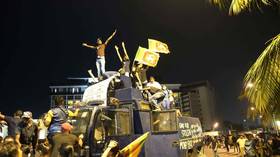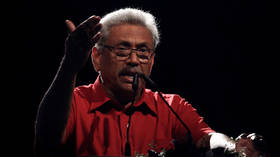US blames Sri Lankan crisis on Russia

US Secretary of State Antony Blinken claimed on Sunday that “Russian aggression” in Ukraine may have been partly to blame for the turmoil in Sri Lanka. The island nation has been in a state of unrest for several months, with food and fuel in short supply and prices skyrocketing. It escalated on Saturday as thousands of protesters stormed the president’s residence, forcing him to flee.
“We’re seeing the impact of this Russian aggression playing out everywhere. It may have contributed to the situation in Sri Lanka; we’re concerned about the implications around the world,” Blinken told reporters in Bangkok.
He claimed that “growing food insecurity” around the world “has been significantly exacerbated by the Russian aggression against Ukraine.” Blinken reiterated his call on Moscow to allow 20 million tons of grain to leave Ukrainian ports which, in his opinion, Russian forces are blocking as part of their military offensive.
He also added that, in Thailand, fertilizer prices have “gone sky high” due to the alleged blockade.
Russia, meanwhile, denies all accusations of blocking food exports. Moscow says it has been offering safe passage to freighters but that Ukraine is preventing civilian ships from leaving ports, including Odessa. It also says Kiev’s placement of sea mines has created a threat to shipping in the area. Earlier this month, Russian Foreign Minister Sergey Lavrov said some countries are trying to use the food security issue “in the worst possible way” by accusing Moscow “of something it is not involved in” and by “whitewashing” Ukraine.
Sri Lanka defaulted on its foreign debt in May for the first time in its history. Fuel rationing was introduced earlier this month, and armed police and troops have been deployed to petrol stations. The crisis has been attributed to the Covid-19 pandemic, which deprived the island nation of vital tourism revenue. An increase in government spending, tax cuts, and quantitative easing drove inflation upwards.
Around 100,000 people are believed to have surrounded the Sri Lankan president’s residence in Colombo on Saturday. President Gotabaya Rajapaksa’s and Prime Minister Ranil Wickremesinghe both subsequently announced their resignation amid mass unrest.













